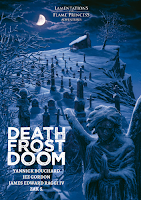19. Which RPG features the best writing?
Answer: Had I answered this question 20 years ago, I probably would have said Gary Gygax and felt pretty comfortable with that answer. However, in hindsight, looking back at the writing in those early gaming materials - even Gary's - gives me a different perspective on the quality of the actual words. Which is not to say that Gary didn't create some great material. Of the early rulebooks, Tom Moldvay's Basic set was probably the best written in terms of the tightest prose that didn't include a lot of corny jokes or exclamation points. A modern analog for the Moldvay example would probably be Chris Gonnerman, author of Basic Fantasy and Iron Falcon. Chris has a very clean, direct style that is well organized and articulate. It's not inspirational writing that makes you daydream about your next campaign, but it is maybe the most clear and plain-spoken in how it covers the rules.
Someone who takes Chris Gonnerman's clear, concise style of rule-explanation and weds it to inspiring prose and truly creative ideas is Lamentations of the Flame Princess's James Edward Raggi IV. The current Lamentations Player Core Book: Rules & Magic is filled with evocative descriptions of things that by this point are treated with a fairly rote tone in RPG writing. For instance, when describing the Fighter class he focuses on the numb brutality of the life that kind of person would lead. This core book doesn't contain a standard introductory section with a definition of role-playing or any examples of play. It assumes the reader is coming to this book with a working knowledge of RPGs and hits the ground running with character creation and the rules of adventuring. Raggi isn't afraid of painting a very specific picture of what kind of game this is.
More than the core book though, for the purposes of this question, I'd like to highlight his Referee Book from the Grindhouse edition of the rules. There famously isn't a more current version of this book. Raggi has been working on it for years now much to the chagrin of his backers and fans. Because of the long wait, Raggi has put the PDF of the old referee guide up on RPGNow for free. Although I prefer physical books, this free digital copy of his guide should tide anyone over. It contains a wealth of information and insight not just in how to play LotFP, but good advice for refereeing any game. Raggi lays out a whole gaming philosophy that takes a critical eye to the way most GMs run their campaigns. It's a gritty, low-magic, less-is-more approach that emphasizes role-playing, exploration, and investigation over a kill-the-monsters/get-the-gold approach.
The tone of this book is more open and conversational than the Rules & Magic book, but no less direct. Raggi discusses in detail how to build campaigns, the various advantages or disadvantages of different settings or published materials, and the role of NPCs and monsters in the game. Here Raggi talks directly to the reader in a way that he doesn't in the player book. It's well-written throughout and presents a distinct different perspective of how to run a fantasy RPG that challenges the standard Gygaxian methods. LotFP is not a game for everybody; Raggi knows that. Even if the horror vibe of this game isn't something you'd ever run, if you're a fantasy GM you should read Raggi's books.
Subscribe to:
Post Comments (Atom)
GM Notes - Morgansfort Session 14 - Death Frost Doom - Part 2 of 2
So, here stands the final chronicle of my two-year Basic Fantasy campaign. It ended a year ago and I'm just now getting around to fini...

-
Jeff Easley's BECMI Thief I’ve recently decided to run an OD&D game. This, of course, brings with it the age-old question of whi...
-
It is around 11:30 p.m. Father Thelbain acts quickly and has his acolytes clean up the remains of the dead, mute cultist, Brother Malach...
-
So, here stands the final chronicle of my two-year Basic Fantasy campaign. It ended a year ago and I'm just now getting around to fini...




No comments:
Post a Comment